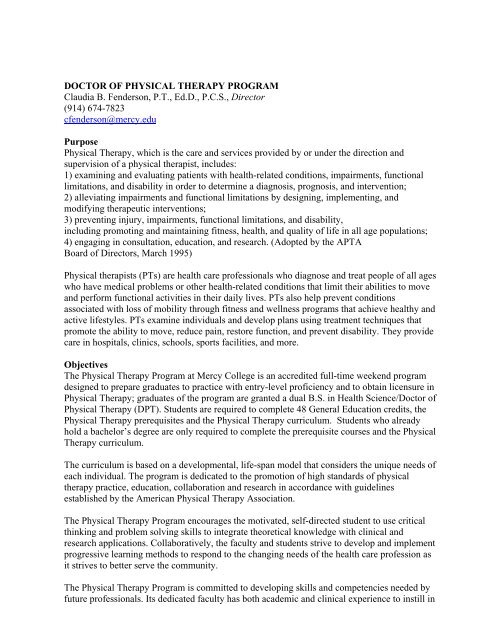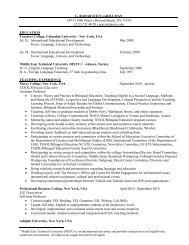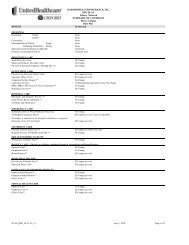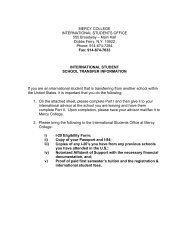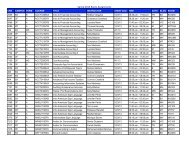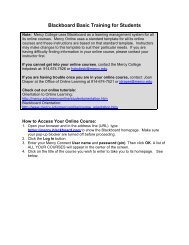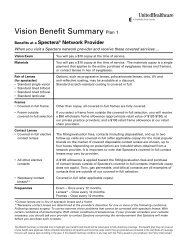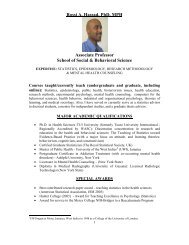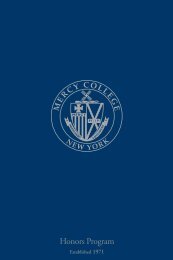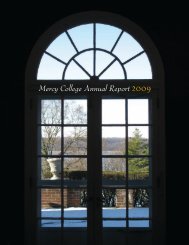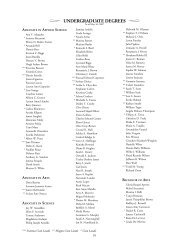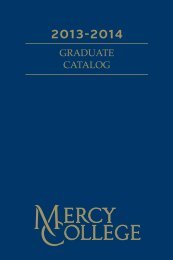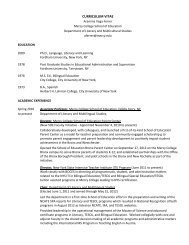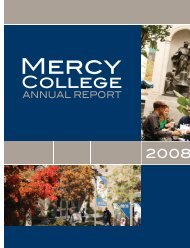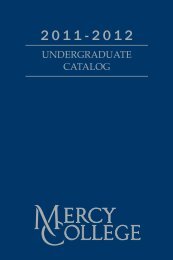MASTER OF SCIENCE IN PHYSICAL THERAPY - Mercy College
MASTER OF SCIENCE IN PHYSICAL THERAPY - Mercy College
MASTER OF SCIENCE IN PHYSICAL THERAPY - Mercy College
You also want an ePaper? Increase the reach of your titles
YUMPU automatically turns print PDFs into web optimized ePapers that Google loves.
DOCTOR <strong>OF</strong> <strong>PHYSICAL</strong> <strong>THERAPY</strong> PROGRAMClaudia B. Fenderson, P.T., Ed.D., P.C.S., Director(914) 674-7823cfenderson@mercy.eduPurposePhysical Therapy, which is the care and services provided by or under the direction andsupervision of a physical therapist, includes:1) examining and evaluating patients with health-related conditions, impairments, functionallimitations, and disability in order to determine a diagnosis, prognosis, and intervention;2) alleviating impairments and functional limitations by designing, implementing, andmodifying therapeutic interventions;3) preventing injury, impairments, functional limitations, and disability,including promoting and maintaining fitness, health, and quality of life in all age populations;4) engaging in consultation, education, and research. (Adopted by the APTABoard of Directors, March 1995)Physical therapists (PTs) are health care professionals who diagnose and treat people of all ageswho have medical problems or other health-related conditions that limit their abilities to moveand perform functional activities in their daily lives. PTs also help prevent conditionsassociated with loss of mobility through fitness and wellness programs that achieve healthy andactive lifestyles. PTs examine individuals and develop plans using treatment techniques thatpromote the ability to move, reduce pain, restore function, and prevent disability. They providecare in hospitals, clinics, schools, sports facilities, and more.ObjectivesThe Physical Therapy Program at <strong>Mercy</strong> <strong>College</strong> is an accredited full-time weekend programdesigned to prepare graduates to practice with entry-level proficiency and to obtain licensure inPhysical Therapy; graduates of the program are granted a dual B.S. in Health Science/Doctor ofPhysical Therapy (DPT). Students are required to complete 48 General Education credits, thePhysical Therapy prerequisites and the Physical Therapy curriculum. Students who alreadyhold a bachelor’s degree are only required to complete the prerequisite courses and the PhysicalTherapy curriculum.The curriculum is based on a developmental, life-span model that considers the unique needs ofeach individual. The program is dedicated to the promotion of high standards of physicaltherapy practice, education, collaboration and research in accordance with guidelinesestablished by the American Physical Therapy Association.The Physical Therapy Program encourages the motivated, self-directed student to use criticalthinking and problem solving skills to integrate theoretical knowledge with clinical andresearch applications. Collaboratively, the faculty and students strive to develop and implementprogressive learning methods to respond to the changing needs of the health care profession asit strives to better serve the community.The Physical Therapy Program is committed to developing skills and competencies needed byfuture professionals. Its dedicated faculty has both academic and clinical experience to instill in
students a spirit of inquiry, and to provide them with high quality clinical educationalexperiences.Expectations of the GraduateThe <strong>Mercy</strong> <strong>College</strong> Doctor of Physical Therapy degree program is designed to prepare studentswith the entry-level proficiencies needed in the practice of physical therapy. Upon completionof the Program, graduates will have the ability to:1. Synthesize knowledge from science and the humanities as a foundation for supportingphysical therapy practice.2. Synthesize and apply knowledge of human development and learning across the life-span tothe practice of physical therapy.3. Develop an understanding of the effect of disability on an individual’s life.4. Utilize the evaluative and interventional processes for consultation on prevention andpromotion of health, wellness and fitness.5. Integrate the five elements of patient-client management (examination, evaluation, diagnosis,prognosis, and intervention) to optimize outcomes in clients of all ages.6. Use a dynamic process of scientific inquiry to competently fulfill the physical therapist's rolewithin a complex and changing health care environment.7. Integrate professional values and ethics in the practice of physical therapy.8. Demonstrate knowledge of the current health care system and an understanding of theimplications of the organizational, political and economic realities on physical therapy practice.Course LoadThe Doctor of Physical Therapy degree program is a full-time weekend program that takesapproximately three years and four months to complete. Students are required to take 9-11credits per semester. Course work may be completed in 10 semesters.Program RequirementsStudents who have successfully completed at least four prerequisite courses listed below with aminimum grade point average of 3.0 are eligible to apply to the Program. All prerequisitecourses must be successfully completed prior to entry into the Physical Therapy Program. Nomore than 2 prerequisite science courses can be taken during the summer before entering theProgram. Volunteer or work-related experience in physical therapy is required. A maximum of24 students will be accepted into each class.Students are required to complete a minimum of 90 credits to be considered for acceptance.These credits must include the 48 credits of required general education courses, and theprerequisites for Physical Therapy. Please note that no more than 75 credits can be acceptedfrom a two-year college. Students with foreign credentials and whose first language is notEnglish are required to complete six credits of college-level English composition to satisfy thedual degree requirements. Those who already hold a BA/BS degree are only required tocomplete the prerequisite courses and the Physical Therapy curriculum. After successfulcompletion of the first year of the program, students will be awarded a Bachelor of Science inHealth Science. After successful completion of the final program coursework, students will beawarded a Doctor of Physical Therapy degree.
Physical Therapy / 205<strong>PHYSICAL</strong> <strong>THERAPY</strong>Undergraduate PrerequisitesAnatomy and Physiology I and II 4 credits eachBiology I4 creditsChemistry I and II4 credits eachPhysics I and II4 credits eachDevelopmental Psychology3 creditsStatistics3 creditsPracticum in Physical Therapy * 2 credits* Graduates of an accredited Physical Therapist Assistant Program are not required to takethis course, which is only open to students accepted into the Physical Therapy Program.NOTE: No student will be admitted into a prerequisite science course if that student does notqualify to take EN 111 at the same time. Courses taken elsewhere will be evaluated forequivalency and transfer credit by the Admissions Department.The grades of any repeated prerequisite courses taken within the last five years will beaveraged together when computing the prerequisite gpa. Students currently repeating aprerequisite course will have the standing grade for that course included in their admission gpauntil the new grade is averaged with the existing grade. All prerequisite courses must becompleted with grades of C or better prior to entry into the Program. An overall gpa of 3.0 orhigher must be maintained for the last thirty credits taken.Program Admission RequirementsAll applicants are required to submit:1. A completed application for admission with the nonrefundable fee.2. Two references on the <strong>Mercy</strong> <strong>College</strong> Physical Therapy Recommendation Form (one lettershould be from a registered physical therapist or a work supervisor and one letter should befrom an instructor of a prerequisite course). The recommendations should give evidence ofacademic and professional qualifications for graduate study, and should be no more than oneyear old.3. A typewritten essay, limited to two pages, on the applicant’s reasons for pursuing a career inphysical therapy.4. Official transcripts from all colleges attended.5. Volunteer/work experience forms demonstrating at least eighty hours of volunteer or workrelatedexperience. The volunteer hours must be in a minimum of two different settings withpreference for candidates who have hours in pediatric and geriatric settings.6. A minimum grade point average of 3.0 for the last 30 credits taken, which must include atleast 5 prerequisite courses.7. A complete application packet, accompanied by a $62 application fee, should be submittedby January 2 for consideration for the Fall semester. Candidates with GPAs of 3.4 or highercan submit applications by December 2 for consideration for early decision.Admission Process1. Prospective students are required to meet with an admissions counselor for evaluation oftransfer credits prior to submitting an application to the Physical Therapy Program.2. An application form and general information regarding eligibility for the Doctor of PhysicalTherapy Program may be obtained from the Admissions Office at the Dobbs Ferry Campus.
3. Selected applicants, rank ordered by grade point average of the last 30 credits completed(which must include at least 5 prerequisite courses), will be called for an interview with therepresentatives of the Physical Therapy Admission Committee before March 15.4. Upon completion of all requirements and interviews, applicant’s records will be presented tothe Admissions Committee. Applicants will be evaluated on the basis of their interviews,essays, grade point averages, and references. Candidates will be notified about admissiondecisions in April for entry to the PT Program for the following Fall.5. Student accepted into the Program will be required to pay a non-refundable deposit of$250.00.6. Offers of admission are for the academic year stated. Students requesting deferral ofadmission are placed back into the pool of candidates for possible selection for the nextacademic year.7. Applicants can only apply to the program three times.Program DesignThe professional program in Physical Therapy is a full-time weekend program that takesapproximately three years, four months to complete. The program is divided into ten semestersof academic work. Classes are generally held on nine to twelve weekends within the fall, springand summer semesters, between the hours of 6:00 PM to 9:00 PM on Friday, 9:00 AM to 6:00PM on Saturday, and from 9:00 AM to 5:00 PM on Sunday. Students are required to take aminimum of nine credits each semester. Since the program involves a full-time graduate courseload, it is recommended that students work for no more than30 hours per week.Practical skills are developed through four full-time 8-week clinical education assignments.Basic Clinical Education is completed between the second and third years, and AdvancedClinical Education I, II and III are taken at the completion of the third year. All clinicaleducation requirements must be successfully completed within 24 months of the didacticcoursework. The professional program contains a total of 96 undergraduate and graduatecredits.NOTE: While attempts are made to address students’ needs, optimal Clinical Educationassignments may be a distance from students’ homes, thus requiring significant travel or theneed for housing accommodations. Students are responsible for the cost of travel andaccommodations.Degree RequirementsRequirements for the Doctor of Physical Therapy Program include:Professional Courses 87 creditsClinical Education 9 creditsTotal 90 credits
<strong>PHYSICAL</strong> <strong>THERAPY</strong> CurriculumYEAR ONE 1st SemesterCreditsHLSC205 Safety Precautions for Health Professionals 1BIOL303 Human Anatomy with Cadaver 4BIOL305 Human Physiology 4Open Elective (may be transferred) 12 nd SemesterBIOL316 Kinesiology 4HLSC410 – Applied Neuroscience for the Rehab Professional 4PHTR500 Introduction to Physical Therapy Measurement 2PHTR505 Pharmacology for Physical Therapy 13 rd SemesterPHTR510 Scientific Writing 2PHTR515 Overview of Physical Therapy Practice 2PHTR520 Motor Learning and Control 1PHTR525 Pathology for Rehabilitation 3PHTR527 Evidence-based Practice 1YEAR TWO 4 th SemesterPHTR530 Introduction to Research Theory 1PHTR535 Childhood and Physical Therapy Practice 7PHTR540 Physical Therapy Assessment and Treatment I 35 th SemesterPHTR545 Adolescence and Physical Therapy Practice 6PHTR550 Advanced Research Theory 1PHTR555 Professional Issues 1PHTR560 Physical Therapy Assessment and Treatment II 36 th SemesterPHTR565 Teaching and Learning Principles in PT 2PHTR605 Basic Clinical Education 3PHTR610 Applied Research Theory 3YEAR THREE7th SemesterPHTR616 Adulthood and Physical Therapy Practice I 4PHTR617 Adulthood and Physical Therapy Practice II 3PHTR618 Radiology for Physical Therapy 1PHTR619 Medical Differential Diagnosis 28 th SemesterPHTR627 Maturity and Physical Therapy Practice I 4PHTR628 Maturity and Physical Therapy Practice II 3PHTR630 Case Study Clinical Problem Solving 39th SemesterPHTR700 Advanced Clinical Education I 3PHTR705 Advanced Clinical Education II 3PHTR620 Professional Management and Administration 3PHTR*** Introduction to Colloquium 1YEAR FOUR10 th semesterPHTR710 Research ColloquiumORPHTR715 Educational Colloquium 3
PHTR720 Advanced Clinical Education III 3TOTAL 96* BIOL courses can be taken prior to admission to the Physical Therapy Program. Due to therigorous nature of the PT curriculum, it may be advantageous to take these courses in advanceof entry to the Program.Physical Therapy Program PoliciesAdvisementUpon acceptance into the Physical Therapy Program, students will be assigned a facultymember who will serve as their advisor. The advisor will be available to meet with the studentsto counsel them on their standing in the program, the requirements for completion of theprogram, and to develop long-term plans of study and future professional directions.AttendanceAttendance and punctuality in all classes and clinical education assignments is required, unlessthe student is excused for extenuating and extraordinary life circumstances. If absence is due toillness, a note signed by an M.D. should be submitted. Missing one weekend day per semesteris equivalent to missing 3-4 classes in a traditional program and may jeopardize a student’sstanding in the program. Course instructors or clinical instructors must be notified in advanceregarding absences. Failure to do this will result in a review of the situation by the FacultyReview Committee. Possible results of absenteeism may include a written warning and/oradditional assignments. If a student misses a test or exam without previously contacting theinstructor, the situation will be reviewed by the faculty and may result in a grade of F for thattest or exam.Absence from any clinical education assignment must be made up or may result in anonpassing grade in the course.Clinical Education GradesAll clinical education courses are graded on a pass/fail basis. If a student fails anyClinical Education course, the decision to allow the course to be repeated will be determined bya Faculty Review Committee. If the student is allowed to repeat the affiliation and fails again,they will be dismissed from the Program. If the student is not allowed to repeat the affiliation,matriculated status will be withdrawn.A student can only withdraw from a clinical education assignment for extenuationcircumstances approved by a Faculty Review Committee. A student cannot withdraw from aclinical education assignment more than once.Graduation RequirementsTo be eligible for graduation students must complete all required course work with a gradepoint average of 3.0 or higher. The coursework includes the completion of research oreducational externship and clinical education requirements.<strong>PHYSICAL</strong> <strong>THERAPY</strong>Incomplete GradesTo request an incomplete grade, students must develop a written contract with the courseinstructor regarding the completion of coursework within a specified time not to exceed the
start of the next semester. Incomplete grades will be granted only under extraordinarycircumstances, such a severe illness, death of a family member, etc. Students may not registerfor any further Physical Therapy courses without permission of a FacultyReview Committee. Failure to complete the work in accord with the contract-specified timewill automatically result in failure for the course.Leave of AbsenceA leave of absence will only be granted for extraordinary life circumstances. The student mustsubmit a written request that will be reviewed by the Faculty Review Committee.If the leave of absence is for more than six months, the student must pass a competency exambefore resuming the Program. If the student fails the competency exam, they must remediatethe previous coursework through independent study and/or auditing courses until they are ableto pass the competency test.Maintenance of Good Academic StandingThe cumulative grade point average (gpa) for both good academic standing and degreeconferral is a 3.00. Grades are subject to review by the faculty advisor and Program Director atthe end of each term. If the term gpa falls below 3.00, the student will be placed on academicprobation.If a student receives a grade of “C” in any course, the course must be repeated beforepermission to continue the curriculum sequence is granted. A student can only repeat a courseif he/she has received a grade of “C” one time. If a student receives a grade of “C” in therepeated course, the student will not be able to continue in the program. A grade lower than a“C” in any course will result in dismissal from the Program.Students will be rated by faculty on their professional development (generic abilities) eachsemester of the Program. If a student does not achieve the expected level of development, aplan of action will be developed by the student and faculty advisor. If a student has notachieved the stated expected level of development prior to beginning clinical education, a planof action will be developed by the Faculty Review Committee and reviewed with the student.The clinical education assignment will not begin until the student demonstrates the expectedlevel of development. A rating of “unacceptable” in any area of professionaldevelopment/generic ability will be reviewed by the Program Faculty Review Committee. Ifimprovement is not made following a plan of action, the student may be dismissed from theprogram.Academic ProbationStudents who have a term gpa of below 3.00 will be placed on academic probation. Ifa student will not be able to achieve a cumulative gpa of 3.00 by the end of the next semester,the student will be dismissed from the Program. If a student receives a grade of “F” in anycourse the student will be dismissed from the Physical Therapy Program and may be subject todismissal from the college. Any future registrations must be reviewed and approved by theProgram Director as well as the Graduate Dean.In all subsequent terms in which the student is on probation, the student is required to achieve aterm gpa of 3.00 or better. If a term gpa of 3.00 or higher is not achieved in any other term, thestudent will be dismissed. Students who receive a grade of less than “B” may be required torepeat the course. Students will be allowed to repeat a course only once.
Maintenance of MatriculationIt is expected that students will fulfill the requirements for their graduate degree by registeringfor all successive sessions. For cohort programs, registration is required during summersession(s). For non-cohort programs, summer registration is not required.Registration is accomplished by either enrolling in classes or Maintaining Matriculation.The Maintaining Matriculation fee is $100 per session and is processed as a registration.Students who have not maintained matriculation and wish to return to their program within oneyear after their last course will be charged the Maintaining Matriculation fee of $100 for eachmissed session. Maintenance of Matriculation without attending classes is limited to one year.Activated US Military Reservists are not required to pay the Maintenance of Matriculation fee.Capstone AdvisementIt is expected that Capstone students shall make satisfactory progress with their program’sculminating activity, which is the Colloquium requirement in the Physical Therapy Program.After the student registers for all sections of their Capstone requirement, they will be given onesubsequent term to complete their work. The Maintaining Matriculation registration must becompleted for this term if no other courses are taken. After this period, a CapstoneContinuation fee (equal to the cost of one graduate credit) will be charged for each additionalterm required to complete the project.A student's degree will not be released until all Maintaining Matriculation and CapstoneContinuation registration and fees are recorded appropriately on a student’s record.Time LimitsRequirements of the BS/DPT in Physical Therapy must be completed within five years fromthe date of the matriculation into the professional program. All clinical education must becompeted within 24 months of completion of didactic course work. Exceptions may be madeby the Director of the Program if the candidate demonstrates circumstances beyond thestudent’s control that temporarily interfere with the ability to complete the program on time.Program AccreditationThe Physical Therapy Program is accredited by the Commission of Accreditation in PhysicalTherapy Education of the American Physical Therapy Association (CAPTE/APTA).Information about accreditation can be obtained from APTA at 1-800-999-APTA.<strong>PHYSICAL</strong> <strong>THERAPY</strong> — Course Descriptions — Physical TherapyPHTR 500 Introduction to Physical Therapy MeasurementThe course consists of lecture and laboratory exposure to basic physical therapy measurements.Principles of joint range of motion, postural assessment, muscle flexibility, and strength testingare included. Students are expected to be able to perform postural assessments, goniometricevaluations and manual muscle testing in standard and modified positions. 2 creditsPHTR 505 Pharmacology for Physical TherapyThis course provides the physical therapy student with knowledge on how drugs interact withthe human body. Basics concepts of pharmacokinetics are introduced and the majorclassifications of drugs commonly prescribed to patients referred to physical therapy arecovered, as are possible side effects and implications for rehabilitation. Special emphasis isplaced on drugs affecting the nervous system, cardiovascular system, respiratory system andmusculoskeletal system. 1 credit
PHTR 510 Scientific WritingThis course provides students with the knowledge needed to recognize factual information andlogical arguments and apply critical analysis to other forms of acquiring knowledge such asauthority, rationalization and intuition. It allows students to become informed consumers of thescientific literature, with the ability to process and synthesize scientific information. The courseprovides an introduction to critical thinking and allows the student to be able to search,summarize, synthesize and process the scientific literature. 2 credits.PHTR 515 Overview of Physical Therapy PracticeThis course reviews the history of the profession and the role of the APTA. It is designed tofoster attitudes and abilities in students so they will have a commitment to continuing personaland professional growth, including leaning through self-directed and independent study.Students develop professional skills including effective communication, team building,subjective interviews, documentation, and cultural competence. Students gain proficiency inmonitoring vital signs, proper body mechanics, draping, transfer and the use of ambulatorydevices (Previously numbered PHTR500). 2 creditsPHTR 520 Motor Learning and ControlThis course provides an introduction to normal motor control. Motor control is considered fromanalysis of neural mechanisms and systems; biomechanical and kinesiological aspects; andbehavior and functional considerations. Issues related to analysis and learning of motor skillsare presented. 1 creditPHTR 525 Pathology for RehabilitationThis course examines the effects of pathological conditions on individuals across the lifespan.It explores pathology as it relates to the rehabilitation potential for patients with disorders of thecardiopulmonary, endocrine, genitourinary, gastrointestinal, hepatic, integumentary,musculoskeletal and renal systems. Student investigate the etiology, epidemiology, clinicalpresentation, medical and surgical management of patients with pathologies of the systemsoutlined above and the impact of the disorders on rehabilitation management. 3 creditsPHTR 527 Evidence-based PracticePhysical therapy assessment and intervention requires that decision-making is based onevidence derived from research. This course provides an introduction to evidence-basedpractice and critical review of the scientific literature. It is intended to enable students tobecome proficient in database search techniques, basic interpretation of published research, anddetermination of the quality of published research to guide clinical practice decisions. 1 creditPHTR 530 Introduction to Research TheoryResearch and critical inquiry are vital in the field of physical therapy, where much of theinformation is passed on in an authoritative manner. Practitioners in the field need to recognizefactual information and logical arguments and apply critical analysis to other forms ofacquiring knowledge such as authority, rationalization and intuition. The course is designed asa general introduction to critical thinking as applied to research literature. The course will helpstudents think more critically about the statements of others and understand logical andpersuasive arguments. 1 creditPHTR 535 Childhood and Physical Therapy PracticeThe concentration of this course is the study of the developmental stages of childhood.
The course will compare and contrast typical and atypical development, including the mostprevalent pediatric disorders. Students will develop the clinical skills needed to performassessment and develop intervention strategies. Laboratory experiences include demonstrationof typical and atypical development, assessments and intervention techniques (previouslynumbered PHTR505). 7 creditsPHTR 540 Physical Therapy Assessment and Treatment IThis course consists of lecture and laboratory exposure to a variety of basic physical therapyexamination and interventions. General principles of the evaluative process including systemsreview and screening are presented. Examination of muscle length, girth, gait analysis, skininspection, sensation, proprioception and cranial nerve integrity are covered. The physicaltherapist’s role in fitness and wellness is presented and students conduct fitness evaluations.Principles of therapeutic exercise and massage are also be presented. (previously numberedPHTR515). 3 creditsPHTR 545 Adolescence and Physical Therapy PracticeThe concentration of this course is the study of adolescence. The course reviews the multipleproblems in the transition from childhood to adulthood. The most common causes ofimpairment/disability encountered in this age group are examined including spinal cord injury,traumatic brain injury, and other musculoskeletal, neurological and cardiopulmonary disorders.Students are exposed to the impact of these disorders on the patient’s social, functional andfamily life. Students develop the clinical skills needed to perform assessment and developintervention strategies. Practicum experiences include demonstration and review of assessmentsand intervention techniques (previously numbered PHTR510). 6 creditsPHTR 550 Advanced Research TheoryThis course provides an introduction to the language, logic and methods of research, as theyrelate to physical therapy. This establishes a foundation to initiate research projects which willbe further developed in the courses Applied Research Theory and Research Externship. Thiscourse provides the skills necessary to become an informed consumer of physical therapyresearch and enables the student to apply critical inquiry and research based information toclinical practice. 1 creditPHTR 555 Professional IssuesThis course prepares students for their entry into clinical practice. It is designed to assist thestudents in developing professional behaviors, including communication skills with theirclients, clinical instructors and other members of the health care team. Students explore issuesin cultural diversity, values and coping skills. 1 credit.PHTR 560 Physical Therapy Assessment and Treatment IIThis course includes lecture and laboratory exposure to a variety of advanced physical therapyevaluation and treatment techniques. Evaluation techniques presented consist of bodycomposition, joint integrity, instrumented gait analysis, and auscultation of breath sounds.Therapeutic uses and electrophysiologic testing are covered. Additional topics covered includepulmonary hygiene, mechanical compression, spinal traction, lasers, biofeedback, diathermyand ultraviolet (previously numbered PHTR610). 3 creditsPHTR 565 Teaching and Learning Principles In Physical TherapyThis course is designed to explore the educational role of physical therapists as learners andeducators with a focus on the education of health professionals, clients, families and
community members. Emphasis is placed on teaching, learning and motivation theories,learning styles and needs, and their applicability in the clinical, professional and academicenvironments. Students develop behavioral learning objectives, instructional strategies andevaluation instruments for use in the classroom, community and clinical facilities. Cultural andgender differences in regard to learning are explored. 2 credits.PHTR 605 Basic Clinical EducationThis is a full-time eight-week internship occurring after the first year of professionalcoursework. It occurs in a variety of physical therapy practice sites under the supervision of alicensed physical therapist. Students are provided with an opportunity to apply the didacticmaterial of the first two semesters, practice clinical reasoning, assessment and application ofbasic treatment techniques, and utilize appropriate therapist/patient interaction. Successfulcompletion of this clinical education is required to continue with the physical therapycurriculum (previously numbered PHTR520). 3 creditsPHTR610 Applied Research TheoryThis course provides students with a thorough understanding of clinical research and itsinteraction with physical therapy practice by combining existing clinical skills and knowledgewith the research process. This establishes a foundation to initiate research projects which willbe further developed in the Research Externship course. Students work in small groups to applyknowledge of the research process to the development of a specific research plan and protocol.Group discussions enhance the critical inquiry process. Presentations are utilized to help thestudents understand the role of the Physical Therapist engaged in research and on the researchteam. 3 creditsPHTR 616 Adulthood and Physical Therapy Practice IThis course examines the maturational stages of adulthood with emphasis uponmusculoskeletal and neurological changes with development. In-depth examination offunctional disorders and other conditions involving the musculoskeletal and neurologicalsystems of the peripheral limbs and associated influence from the spine are explored. Theimpact of these disorders on the functional capacity for performance of life tasks are alsoevaluated. Also covered are the application and practice of examination, evaluation andintervention techniques as well as diagnosis for the peripheral joints. 4 creditsPHTR 617 Adulthood and Physical Therapy Practice IIThis course examines the maturational stages of adulthood with emphasis uponmusculoskeletal and neurological changes with the spine and related joints. In-depthexamination of functional disorders and other conditions involving the musculoskeletal andneurological systems of the spine are completed. Examination and intervention for women’shealth issues are also discussed. Exploration of the impact of these disorders on the functionalcapacity for performance of life tasks are completed. This course also covers the applicationand practice of examination, evaluation and intervention techniques as well as diagnosis for thespine. 3 credits.PHTR 618 Radiology for Physical TherapyThis course covers the basic elements of clinical interpretation, and indications of imagingtechniques. Various imaging modalities including plane film X-ray, magnetic resonance,computerized tomography and radioisotope imaging are covered. Selection protocols for eachare discussed to acquaint the student with advantages and disadvantages of each method andthe type of information each technique best presents. This course focuses on the clinical
interpretation and practical integration of imaging data into rehabilitation treatment regimendesign and communication with other medical professionals. 1 creditPHTR 619 Medical Differential DiagnosisThe physical therapist’s role as an independent practitioner working in a collaborative medicalmodel requires the ability to identify signs and symptoms of systemic disease that can mimicneuromusculoskeletal dysfunctions. The content of this course includes a discussion ofphysical therapy diagnosis, interviewing techniques, and a review of systemic origins ofneuromusculoskeletal pain. This course enables the student to recognize clinical manifestationsthat warrant a referral to another member of the health care team. 2 creditsPHTR 620 Professional Management and AdministrationThis course involves the study of administrative and organizational knowledge essential to theprofessional practice. Students are exposed to issues such as changes in the health careenvironment; managed care and reimbursement. The course also addresses issues in bioethics;legal aspects of physical therapy; technology; program planning and marketing. The courseintegrates professional concepts and reinforces professional competencies (Previouslynumbered PHTR615). 3 credits.PHTR 627: Maturity and Physical Therapy Practice IThe normal developmental process of aging is covered as are abnormal adjustments to aging;psychological dysfunction; and ethical issues associated with aging. The most common causesof cardiovascular and pulmonary dysfunction encountered in the elderly are examinedincluding atherosclerosis, pulmonary disease, cardiac disease, diabetes, peripheral vasculardisease and wound care. Diagnostic testing, appropriate physical therapy examination skillsand physical therapy interventions for each of the above are also covered. 4 credits.PHTR 628: Maturity and Physical Therapy Practice IIThis course will focus on the common dysfunctions involving the neurological andmusculoskeletal systems in the elderly population. Diagnostic tests, examination and physicaltherapy intervention will be covered. Students will be expected to integrate knowledge of thenormal and abnormal aging process (covered in maturity I). 3 creditsPHTR 630 Case Study Clinical Problem SolvingIn this course, students synthesize processes and strategies to promote effective clinicalreasoning and problem-solving. Case studies are used with a variety of diagnoses, settings, andage groups to facilitate the development of clinical reasoning skills.Students are expected to utilize the didactic knowledge gained throughout the curriculum asthey work with simulated patients through the entire course of treatment from chart review,evaluation, treatment planning and instruction, written documentation and discharge planning.3 credits.PHTR 699 Independent StudyThis course provides students with an opportunity to complete a special project or area ofstudy, designed by the student, faculty member and Program Director to maximize a currenteducational experience covering material not currently offered as a regular course. 1-3 creditsPHTR 700 Advanced Clinical Education IThis full time eight-week internship occurs after the second year of professional courseworkunder the supervision of a licensed physical therapist. Students are provided with an
opportunity to integrate the comprehensive didactic material of the full two years ofprofessional coursework as well as utilizing advanced assessment and treatment techniques,documentation and clinical reasoning (previously numbered PHTR625). 3 creditsPHTR 705 Advanced Clinical Education IIThis eight-week internship occurs under the supervision of a licensed physical therapist andprovides students with an opportunity to enhance the clinical skills gained during previousinternships. Upon completion of this clinical education experience, the student is expected tofunction at or above the minimum entry-level competence of physical therapists (previouslynumbered PHTR635). 3 credits.PHTR 706 Clinical Education ContinuationStudents whose clinical education placements extend into the Fall semester must maintainmatriculation by registering for this course. 6 credits.PHTR 708 Specialty Clinical Education:This course allows students to gain experience in a supervised clinical education placement inan area of physical therapy specialization (i.e., neonatal, advanced orthopedics,cardiopulmonary, burns). 1-3 credits.PHTR 710 Research ExternshipThe Research Externship provides students with the opportunity to investigate a specific aspectof physical therapy theory or practice. The Externship provides individual mentorship andgroup supervision by a faculty advisor and is designed to facilitate successful participation asan investigator for a research project (previously numbered PHTR630). 4 credits.PHTR 711 Research Externship ContinuationStudents who have not completed their research project by the required timeline must registerfor each term until their project is completed. Equivalent of 1 creditPHTR 715 Educational ExternshipThis course provides students with an opportunity to develop their skills as educators of healthprofessionals, community members, and clients throughout the lifespan. Students incorporatetheories of teaching, learning and motivation in small and large group presentations includingin-services and teaching in professional and academic environments. In all presentations,students develop behavioral learning objectives and instructional strategies and evaluate theeffectiveness of their teaching. 4 creditsPHTR720 Advanced Clinical Education IIIThis eight-week internship occurs under the supervision of a licensed physical therapist andprovides students with an opportunity to enhance the clinical skills gained during previousinternships and allows students to refine and cultivate skills with clients across the lifespan withinterdisciplinary team members. Upon completion of this clinical education experience, thestudent is expected to function at or above the minimum entry-level competence of physicaltherapists. 3 creditsPHTR 890 Capstone ContinuationStudents who have completed all coursework but have not completed their capstone projectwithin the required one term must register for this course each subsequent term until the projectis completed. No Credit but Cost is equivalent to 1 credit.
PHTR 899 Maintenance of MatriculationStudents are expected to register in successive terms to maintain status as a matriculatedstudent. However, if a student cannot enroll in a term, maintenance of matriculation is required.The fee is $100 per term and is processed as a registration. Maintenance of Matriculationwithout attending class is limited to one year. Students who have not maintained matriculationand wish to return to their program within one year after their last course will be charged thefee for each missed term. Activated US Military Reservists are not required to pay the fee. Nocredit.Note: All physical therapy classes may require an online component and students are expectedto have internet access and to participate in on-line discussion.PRE-PR<strong>OF</strong>ESSIONAL COURSESHLSC 203 Practicum in Physical TherapyThis course is offered as a combination of online study and in-class instruction. Students areprovided with an overview of the field of Physical Therapy through independent work,observational experiences and small group discussions. Students become familiar with medicalterminology typical of that encountered in the profession. The interaction of physical therapistswith other members of the health care team is explored. This course is required for studentsaccepted into the professional program who are not physical therapist assistants. 2 credits.


